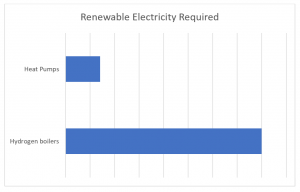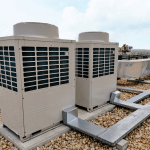Hydrogen vs Heat Pumps. Debunking the Hydrogen Myth.
As more and more organisations look to future-proof their heating and hot water systems with more renewable forms of heating, the question arises as to whether heat pumps are just a stepping stone to something better. Heat pumps have an important role as we decarbonise heat, but their large physical footprint and high installation costs have led manufacturers to explore alternative solutions.
Hydrogen-ready boilers are one of those solutions, requiring no greater upheaval than a straightforward, like-for-like boiler change.
Hydrogen Boilers
Manufacturers are now building boilers with the ability to run on hydrogen with just a simple adjustment which involves replacing the gas valve, a small, inexpensive part. This means that when or perhaps if, the government changes the gas network over to hydrogen, with a small tweak to the boilers, we’re there, Net Zero!
This approach offers a cost-effective means to the end user, of reaching the net zero target without all the upheaval of upgrading heating systems, electrical supplies and of course the national grid, that would likely be required with heat pumps.
Unfortunately, it’s not quite that simple.
The Gas Network Challenge
The existing gas network works brilliantly and its abandonment does seem wasteful as we strive for a Net Zero United Kingdom. Introducing hydrogen as a renewable alternative to gas looks like a good option to save it. However, the properties of Hydrogen differ quite a bit from the properties of natural gas throwing up a host of challenges.
Hydrogen is lighter than air and tends to accelerate straight up like smoke in the event of a leak. As it’s completely invisible, unless you are directly above the leak you will not know it’s there. In comparison natural gas is very dense and spreads outwards rather than up, which is why you can smell it when there is a leak.
Secondly, hydrogen is a lot more flammable than natural gas and will ignite much quicker.
Thirdly, natural gas boilers run on a very low gas pressure of around 21 mbars. That’s about 1.05% of the pressure of your average water main. Although the pressure required by hydrogen boilers is not yet officially known, due to its nature it will likely be a lot higher than this, raising the question of whether the existing gas network would be able to stand up to the higher pressure.
Producing Hydrogen
Generating hydrogen renewable involves a process called electrolysis. Water electrolysis is the only form of hydrogen that produces zero carbon in production. This is often referred to as green hydrogen. The issue with this process is it requires a lot of energy. At best for 1 unit of electricity, we can only produce about 0.7 units of hydrogen. Most electrolysers currently available will only produce 0.4-0.5 units. So the maximum efficiency a hydrogen boiler can every be after allowing for the local combustion at the boiler itself is about 60-65%.
Heat Pumps
In stark contrast to hydrogen boilers, heat pumps will produce up to 4 units of useful heat energy for every 1 unit of electricity in favourable weather conditions. In unfavourable conditions, they will still produce around 2.5 units per 1 unit of electricity. This translates to an average efficiency of 325%. This means that the electricity required to power the nation’s heating with heat pumps is far less than that of hydrogen boilers. The graph below illustrates this will estimated figures of the electrical energy required for the two options.







